Radiant Historia: Perfect Chronology (Nintendo 3DS) Review
By Renan Fontes  05.02.2018
05.02.2018

No matter how competent a remake is, it will always run the risk of tarnishing its source material. This is true for film, it is true for television, and it is especially true for videogames. Perhaps because of the quick rate at which technology has been expanding, it’s not unusual to hear fans clamour for a remaster of their favourite game. A good game will age gracefully, but it will age nonetheless. Radiant Historia doesn’t show its age too much, even eight years later, but it is in a unique position where a re-release of any sorts would make sense. It undersold in Japan, had a limited stock in North America, and was never released in Europe. The game itself didn’t need to be remade, but it did need the exposure. While a straight port would be justified in this context, Perfect Chronology strives for far more. Following Cubed3’s early hands-on, it is time to deliver the final verdict.
While Radiant Historia: Perfect Chronology is technically a remake, there is good reason for confusion regarding its status as it looks near identical to its original release on the Nintendo DS. The resolution is higher, of course, and the general look of the world is smoother, but the sprites are basically left untouched. Side by side, the new UI is the only distinguishing feature between the two games. In theory, that should be a bad thing, shouldn't it? A remake should strive to improve upon the original and, most of the time, that's done by enhancing the art and general look. Radiant Historia doesn't need a graphical makeover, though. Its 2D sprites look just as good now as they did then and combat always looked fluid. An aesthetic shift could have seriously hurt the remake, and that's exactly where Perfect Chronology's true strength lies: it's not looking to change itself, it's looking to improve.
Many remakes try too hard to change too much. The Wind Waker HD hurt a timeless art style by throwing in bloom and dynamic shading, for example, and the upcoming Final Fantasy VII remake has completely tossed out the old gameplay in favour of a more modern take. Both remakes changed something fundamental about the titles they were remaking and while that doesn't account for their individual qualities, it does mean a definitive version can no longer exist, since the remakes offer too wildly different an experience, whether aesthetically or mechanically. Atlus and Headlock haven't done that, however, instead choosing to adhere to the original as much as possible.
Even though there are minor changes to the gameplay, such as including support attacks for benched party members, combat is exactly as it once was. If there's one aspect of Radiant Historia that needed to be left alone, it was the gameplay. Battles are some of the most engaging in the turn-based genre thanks to the dynamic way enemies move around the field and the wide array of strategies Stocke's party can take in tackling any scenario.
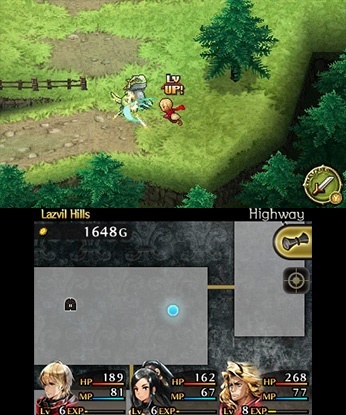
While Stocke's party remains stationary in battle, the left side of the screen is dedicated to a 3x3 grid that enemies can travel upon. The closer an enemy is to the party, the more damage they take and inflict; the further away, the less. Enemies will occasionally move around the field themselves, but Stocke and company can influence their placement through clever skill use. Each party member has access to multiple abilities that can push and pull enemies around. Knocking an enemy into another will cause both to take damage, but those two enemies can then be pushed into another enemy to keep the onslaught going. Due to the way turns are calculated, however, this isn't as simple as picking the right abilities at the start of a battle.
In most turn-based RPGs, the player tends to attack first, followed by the enemy. The point being, turns are defined in a clear order. The enemy doesn't attack during the player's phase and vice versa. Radiant Historia's battle system instead tosses turns in an ever rotating column on the bottom screen. At any time during combat, it's possible to simply look down and check what the order of the next ten turns will be. Most battles give Stocke the initial attack, but it is fair game otherwise. In allowing the player to see the order in which everyone attacks, it's possible to develop strategies and whittle down the opposition before they can attack. It's also possible to swap turns mid-battle at the expense of being more vulnerable to damage. Despite the drawback, changing places can lead to incredibly in-depth combos. Stocke can strike an enemy upwards, Raynie can push them back, Marco can pull them forward, and Stocke can strike them down again so Raynie can attack everyone in one convenient spot.
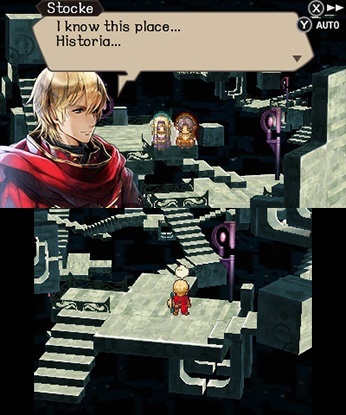
Traps also play a role during battle. By placing a trap on the field, enemies can be knocked into them for extra damage and a higher combo. Depending on how high the combos go, Stocke's party will receive bonus EXP for its trouble. Many RPGs allow the party to coast through random battles without taking advantage of their skills, but burning through MP is always encouraged here. It is worth mentioning, though, that battles aren't random. Instead, they are triggered by either attacking or bumping into an enemy on-screen. It's possible to avoid most fights entirely, but the action is so gripping that that's unlikely to happen very often.
Since the battles themselves are their own puzzles of sorts, especially on the hardest difficulty, there aren't many traditional dungeon puzzles to solve. Interacting with the world mainly consists of obtaining new abilities through the story to pass through narrative roadblocks. That's not to say the overwork isn't fulfilling or interesting, however. There are many areas to explore with plenty of chests to discover, it's just that there simply isn't an intricate puzzle solving angle outside of combat.
It should be noted that Perfect isn't a radically different experience from Apend, as both modes tell the same story. The land of Vainqueur is on the brink of Desertification, an apocalyptic phenomenon that will turn the continent and all its inhabitants to sand. Stocke, an agent for the Kingdom of Alistel, finds himself in the midst of the upcoming plague when a near-death experience awakens a blank book, the White Chronicle, and sends him to Historia, a world that exists within neither space nor time. There, he is tasked with stopping the Desertification, and solving its mysteries, by jumping between two timelines. This time jumping ends up being Radiant Historia's main gimmick. Stocke will occasionally hit a wall in one timeline where he can't proceed, prompting him to go into the parallel timeline to find a solution. This could quickly become overwhelming, in theory, but the story is kind enough to point these moments out without lingering too deeply on them.
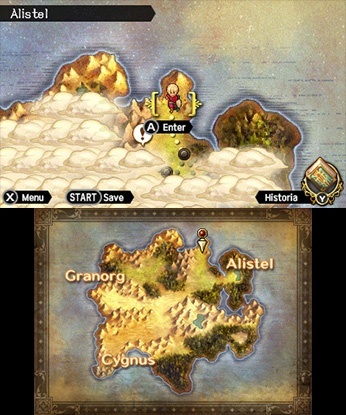
Stocke’s relationship with the White Chronicle could have easily been one of a man with his tool, used exclusively to move the plot forward, but it’s thankfully far more nuanced than that. The greatest literary blessings are double-sided. As magnificent as Stocke’s ability to influence the future and travel through time is, he isn’t capable of affecting the flow of time in whatever way he pleases. There are several moments in the story where Stocke anguishes over the seemingly random nature of the White Chronicle. As useful as it is, it also makes him more keenly aware to the turmoil around him. Through these moments, Stocke is put into a position of genuine struggle often absent in JRPGs. His growth as a character is intimately tied to the White Chronicle, giving the tome a dual purpose. It is just as much a compelling gameplay mechanic as it is an incentive to develop the cast and plot with considerable maturity.
Mature is an apt description of the narrative. Many RPGs tackle politics, religion, and race, but few do it with as much grace, tact, and humanity as Radiant Historia. The political angle is never lost, nor is it thrown in for a falsified sense of realism. The conflict between Alistel and Granorg is a reality in Vainqueur, one explored bluntly without favouring either side. Commentary on organised religion has been done to death in the genre, but here it’s a necessary part of understanding the world and the underlying motivations of certain characters. It isn’t included simply because other RPGs have, it’s included because it is a genuine part of the human experience. Race is the trickiest of these topics, and the story does shy away from lingering on real racism, but the hostility between different species gets the point across just as well due to the care taken with establishing why one race would show cruelty to another. These aren’t just components in a story, they are themes that are explored to their fullest from start to finish.
It’s easy at times to forget about the looming Desertification plaguing the world due to how fleshed out all the themes are. The story truly is novelesque in nature, ripe for literary analysis. There hardly seems to be any wasted space in the script, every line used to establish tone, build the world, or develop a character. Many games, regardless of genre, struggle to use their words wisely. It’s a breath of fresh air to play through an RPG that knows every word has value. When Stocke speaks, the player gains a better understanding of his character. When an NPC shares a random piece of information, it’s to better develop the world. Antagonists go on about their political doings because that’s a real way to ground them.
As realistic as the main events in the story are, the White Chronicle is an inherently magical artefact that imbues mysticism into the plot. Along with the abstract world of Historia, it seems as though the plot can rip apart at the seams at any moment. Many RPGs struggle to tow the line between realism and fantasy, but that’s not an issue here. Historia and the White Chronicle are so abstract and limited in their presentation that they don’t take away from the more overt narrative. Even though Stocke is constantly jumping between timelines, his jumps stay grounded. The shifts are purposeful and the stories in each timeline don’t rely on explicitly magical influences outside of Stocke’s interferences.
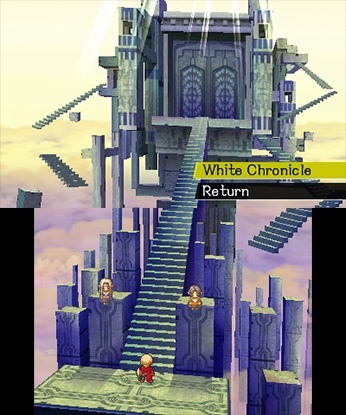
That isn't to say magic doesn't play a role in the world of Vainqueur, however. Most characters have access to magic, or rather Mana, and there are mythology-inspired races that utilise magic quite heavily, but their presence in the plot comes from a place of commentary. To paraphrase a mid-game party member, the world is in peril because humans are not taking care of their land. The other races are more in-tune with nature and thus have a more magical inclination, whereas humanity is absorbed with warfare and vanity, leading to a technological, almost dystopian atmosphere. Nothing shows this better than the dichotomy between Alistel and Celestia. The former is the grey and ironclad home-base of Stocke, and the latter is a surreal, almost dream-like village, lush with colour. Mana isn't just flavour, it makes a point.
Stocke's party as a whole is especially deserving of praise. Due to the nature of the two main timelines, they are unlikely to all be together at once often, but the growth they experience between both scenarios melds together brilliantly. What is revealed about a character in one timeline shines new light on their actions in another, all without feeling awkward. Just as importantly, the story doesn't try to force each character to have a full arc in both timelines, instead choosing carefully where their development is most appropriate. By the time the credits roll, no party member is left lesser than the other. Stocke, in particular, stands out as one of the most nuanced and believably competent protagonists in a long time.
Amazing as the cast already was, they are only improved by the fantastic voice direction. Any dub can have a good cast, but it takes a great team to know how to direct and use its cast. There is not a single poor performance; an impressive feat for any dub. The voice actors enunciate and articulate well, but they also inject their personality into their characters. Stocke's mannerisms towards his lifelong friend Rosch, is strikingly different than his delivery with his superior, Heiss. The cast isn't just reading words off a script competently, the members are genuinely acting. The exclusion of the Japanese audio isn't exactly a good thing, but the dub is plenty impressive to the point where that shouldn't be an issue, except for purists. As a whole, the inclusion of near full voice acting was a worthwhile one that betters an already strong story.
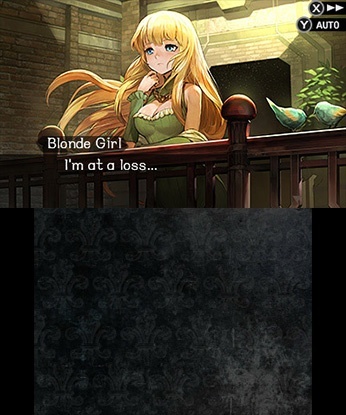
The new scenario's story, while not nearly as good as the main game's, is an ultimately good addition. Some sections of it do feel like filler, but that's to be expected considered how tight knit and meticulously crafted the base narrative is. Adding anything onto it is bound to be rough around the edges. The new character, Nemesia, is also the worst written character in the entire adventure, and she feels jarringly out of place both in characterisation and design. Possible History is interesting, nonetheless, and does offer plenty of new content to wade through, whether it's new content for fans hopping into Perfect right away or newcomers looking to tackle the third timeline at the end. It's also worth noting that completing Possible History opens up a new ending. Really, the best aspect about the new scenario is that it's optional until Apend's ending. It's wholly unnecessary for understanding the story, but it's a fun inclusion. Were there no options in choosing whether or not to start the story with it in place, it likely would have soured the overall experience, but it's well handled as it is.
Far too many remakes and remasters end up ruining something that made their source worth revisiting, but Perfect Chronology doesn't have a major issue like that. Possible History isn't an amazing addition, but it adds new detail to the world and lore, making Vainqueur all the richer. The new content is mostly optional, the aesthetics are virtually identical, and the original experience is preserved as pristinely as it could have been, while also improving upon the gameplay. Radiant Historia: Perfect Chronology is the ideal remake, honouring the original while moving it forward.
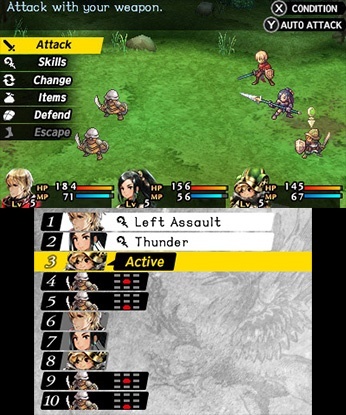
Cubed3 Rating
Exceptional - Gold Award

Radiant Historia: Perfect Chronology is one of the finest games on the 3DS, one of the finest RPGs in its genre, and one of the finest remakes of all time. The lack of modification done to the sprites will surely sour some, but it's arguably for the best, as it preserves the aesthetic identity of an already great looking adventure. The amazing combat system is thankfully left untouched, the new scenario offers more than its weight in gameplay, and the optional nature of most of the new content means anyone uninterested in the changes can simply find comfort in an amazing base experience. Radiant Historia was good enough where it didn't need a remake, but it's wonderful it got anyway.

![]() 9/10
9/10
![]() 0
(0 Votes)
0
(0 Votes)
 Out now
Out now  Out now
Out now  Out now
Out now  Out now
Out now Comments
Comments are currently disabled

 Sign In
Sign In Game Details
Game Details Subscribe to this topic
Subscribe to this topic Features
Features





 Top
Top

